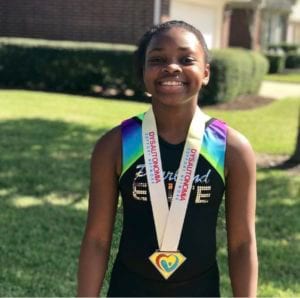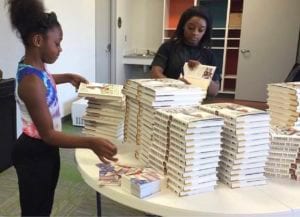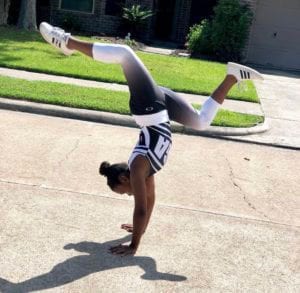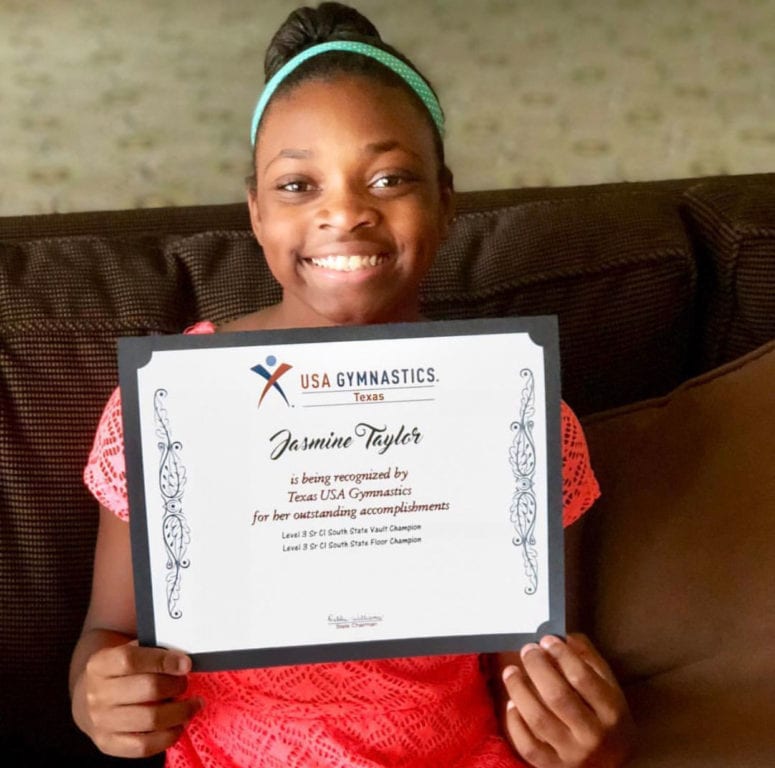My name is Jasmine Taylor and I am 12 years old.
October is one of my favorite months (July is the other one- it’s my birthday month!)…
Let me tell you why. It’s Dysautonomia Awareness Month and I have Postural Tachycardia Syndrome (POTS).
I used to be ashamed of being “different”. I thought if people knew about my dysautonomia they would treat me differently.
I also have an arachnoid cyst, epilepsy and gastroparesis.
What does all of that mean? Well, the arachnoid cyst means I was born missing a portion of my brain– not a big portion, just a small part at the bottom part of my brain.
It’s interesting how it still works pretty good even with missing parts. The epilepsy means I have a seizure disorder.
I was diagnosed with complex-partial seizures as a baby. My seizures are under control now. And the gastroparesis means my stomach muscles are paralyzed and my stomach empties very slowly. Having all of this is a lot already. Did I mention how much fun an overactive bladder is? Trust me- it’s not that fun at all. Running to the bathroom every five minutes is just an extra unnecessary workout, which I am happy to say is under control too!
And then there’s the dysautonomia. Getting diagnosed with dysautonomia did not come as easy as the other diagnoses. It took a few years before someone knew what was going on with me. At first, I was just really tired and needed to rest a lot. Then, it became hard to get out of bed in the morning at times. Sometimes, I would get out of bed and then fall to the floor because my legs wouldn’t cooperate. Since I was already on the floor, I’d just take a nap. I knew I was probably going to be there for a while anyways. Taking warm showers usually make people feel better, but for me it was always scary. My mom always stayed very close, just in case this noise she heard was me, and not the soap falling in the tub.
Warm showers were very draining, and after my showers I had to rest again because all my energy was gone. I missed many days of school because of doctor’s appointments and mainly because I had no energy. Going to the store became harder every day. Taking trips in the area, or going to church, or just to visit a friend, always took planning. Walking long distances was something I just couldn’t do, and short distances kept getting shorter. My brother would usually end up carrying me on his back or we had to make sure the places we would go had baskets so I could ride. Even something as simple as watching television was hard. If I was sitting upright, my heart rate would become very high, my breathing would be very fast, and I would just start sweating. It felt like I was running a marathon from my seat.
We saw many doctors who always said there was nothing wrong, it was all in my head, or that I was just faking.
They would tell me to not play so hard with my friends and rest when I feel tired. I always felt tired, and it was not all in my head. If I had one good day where I could play with my friends, it would take me five days to rest up for another good day.
My mom knew it wasn’t all in my head and that I wasn’t faking. She refused to believe what the doctors were saying and she found me another doctor who believed me too. The doctor who saw me read my records and report, and said she thought she knew exactly what was going on with me.
She said, “It sounds like you have dysautonomia.”
We were like, “What???”
She referred us to a neurologist, who also treats kids with dysautonomia. From the very first day that I saw Dr. Lankford from the Dysautonomia Clinic, he made sure to never make me feel as if what I was going through was “all in my head.”

He listened to everything we told him and he began treating me right away. He wanted my life to be “normal” again. He began prescribing medications that took care of my pain, my tremors, my headaches, my seizures and my heart. I began physical therapy three days a week. My therapist worked with me walking distances again. She taught me how to use my heart monitor and to monitor my heart rate. I had to get a wheelchair, and she worked with me and taught me how properly drive my first set of wheels (it has my name on it and everything!). I still use my wheelchair at times, for days when I get too tired to walk and my symptoms flare up.

Dr. Lankford told me he would do everything he could to make my life feel normal again, and I am happy to say my life feels really good right now. I am a competitive gymnast now. (Fun fact: I used to train at Simone Biles’ gym, World Champion Centre, and I have met her. She is pretty awesome in person, but it’s her brother Adam who is the funniest!) I am a Level 3 State Champion. I am currently a Level 4 gymnast in Houston and I am training at Houston Gymnastics Academy. I am once again training and preparing to qualify for another state competition and moving up another level. My goal is to continue to compete and qualify at nationals, worlds, and one day, the Olympics. Everything is possible!
My favorite scripture is Philipians 4:13. It says, “I can do all this through Him that gives me strength.”

There’s a quote that says, “Aerodynamically the bumble bee shouldn’t be able to fly, but the bumble bee doesn’t know it, so it goes on flying anyways.”

I have POTS, and I run, flip and fly in the gym sixteen hours a week as a competitive gymnast. My body doesn’t know it’s not supposed to do all of the amazing things it does, so I just go on flipping and flying anyways. I started out by saying that I used to be ashamed of being “different”. I wanted to fit into everyone else’s world. My mom told me I was born to stand out and change the world. So instead of being ashamed, I should bring people into my world and teach them about me.
Now, I celebrate my dysautonomia (no, really- I celebrate it! I have it; it doesn’t have me.) I wear my turquoise and proudly share my story. Every time I get to bring someone into my world and share a little about me, I get to change theirs. Not everyone they meet will have a disability they will can see. Hopefully, after they “see” me, they will walk away seeing differently.
Share your stories, thoughts, and hopes with the Patient Worthy community!
Want to learn more about dysautonomia? Check out our friends, the Dysautonomia Advocacy Foundation.







